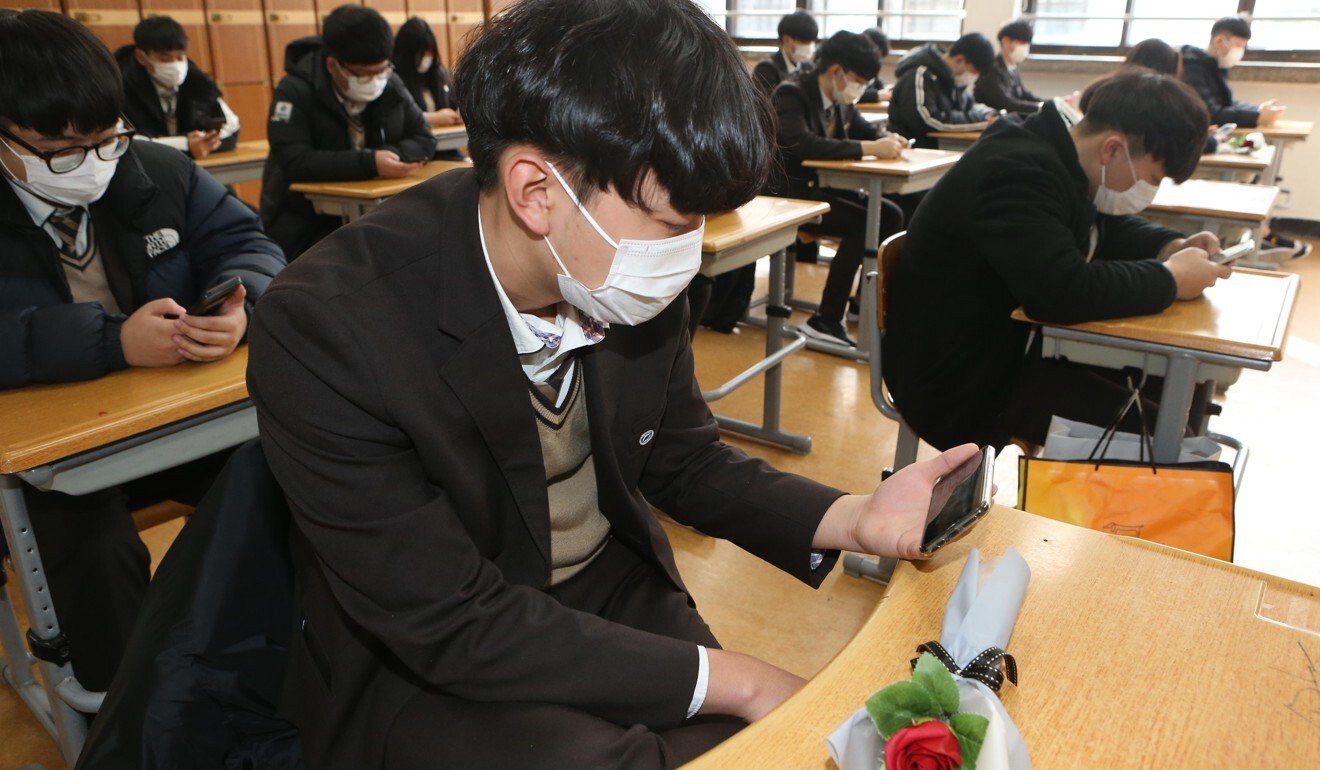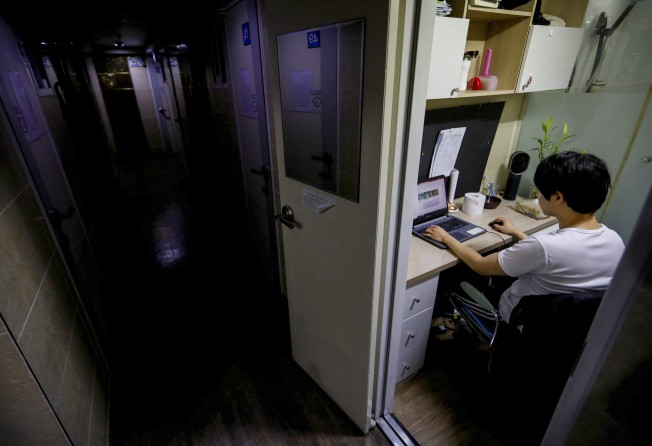
Coronavirus: think home-schooling is stressful? Spare a thought for South Koreans
- Students facing one of the world’s most notoriously stressful exams – the eight-hour Suneung – fear the virus has compromised their chances
- Most study halls that help them prepare have shut, adding to their worries. However, some are seeing the bright side too

As parents and students across the world struggle to come to terms with the horrors of home-schooling, spare a thought for those in South Korea.
In a country that takes education so seriously that aeroplanes are sometimes diverted to avoid distracting students, the switch is proving particularly stressful.
Classes finally resumed this week after the coronavirus outbreak turned what was supposed to be a typical two-week Spring break into 38 days of school-less uncertainty. But even then students did not return to their desks as they had hoped. Instead they had to navigate a strange new world of live-streaming through the Educational Broadcasting System’s Online Class and videoconferencing over Zoom, with all the teething issues that entails.
While that will be a familiar scenario to the hundreds of millions of students across the globe who are estimated to be home-schooling during the outbreak, few are under the same pressure as their South Korean counterparts.
Usually at this time, final-year students are beginning their run-up to what is widely seen as one of the world’s toughest and most stressful school-age exams, the eight-hour Suneung or College Scholastic Ability Test. So important is the life-defining Suneung, which determines everything from whether a student will go to university to their job prospects and even their future relationships, that aeroplanes change their flight paths and businesses their opening times to keep noise to a minimum during its duration.
News that the exam will now be delayed has unsettled many students who are also fretting that the quality of teaching will fall during the period of home schooling.
“For students who will be taking Suneung like me this year, this is such an absurd moment for us,” says Choi Jung-min, 19, a high school senior preparing to take the exam, which is normally held in November but has now been postponed to December. “I’ve been preparing two years for this test, but it seems that my efforts may come up short in the end.”
Choi is far from the only one feeling anxious. School schedules and test dates have changed multiple times in recent weeks, introducing an element of chaos in an area where the country usually excels thanks to a strict focus and military efficiency.

Problems with home-schooling software have only fuelled her misgivings. “The online system is uncomfortable to say the least as the server keeps shutting down and errors keeping popping up,” says Choi.
Some even fear that if students struggle to adapt the country’s reputation as having one of the best – if not the best – education systems in the world could also come under threat. From 2014 to 2018, the country topped the NJ MED’s World Top 20 Education Poll, which looks at factors such as test scores and graduation rates. In 2019, it came second, and it is in only third place for the first quarter rankings of 2020.
SLOW GOING
Kim Ye-dam, 17, has been taking online classes since last month at a private school in Goyang, a city just north of Seoul.
“Our pace in class has become significantly slower, and it’s become harder than ever to concentrate during class as I’m staring into a computer screen for hours on end,” says Kim. “Our home is not the quietest place as I have two siblings, and then there’s the fact that I have become lazy staying at home all day.”
Before the pandemic, high school students would normally continue their test preparations after school hours at academies, study cafes or study halls. But government measures against the virus strongly recommend such institutions close.
Those that have remained open have been criticised for failing to enforce adequate safety measures.
“I was told that teachers and students take off their masks during break time and talk with each other,” a user commented on the online school-parent community DSchool. “It all becomes useless if there is at least one infected person in the class.”
Son Ji-hwan, a classmate of Kim at Lighthouse International School, has decided not to continue attending his after-school academy. His family has instead focused on transforming their home.
“My parents gave me the biggest room in the house so that I could have a big study space,” explains Son, who lives with two siblings.
For students like Son, online lectures provided by test-prep institutions have become an essential study tool.
Megastudy, one of the largest test-prep enterprises in the country, recorded a profit of 10 billion won (US$8.2 million) over the past three months. Two years ago, it took a year and a half to make the same amount.
SEEING THE BRIGHT SIDE
And it's not just firms like Megastudy that have seen the bright side. Even in the stressful world of education in South Korea, some are coming around to the idea.
“With all this free time that my kid has at home, I am allowing him to spend it as he wishes,” says Cha Suk-hee, a 49-year-old junior school teacher in Yongin, just south of Seoul. “He’s become pretty technical with his yo-yo tricks and he’s finished numerous TV series.”
Even though her son in the seventh grade has a private tutor, Cha is letting him have a “long break.”
“I mean, when is he ever going to have such time in his hands in the future?”
Son, too, who is preparing to take Suneung, sees some advantages.
“When I went to school and after-school academies, I didn’t have time to take a break except during lunch and dinner. Now I get to spend time and eat with my family, I think I’ve got a lot closer to them. I’m happy these days.”